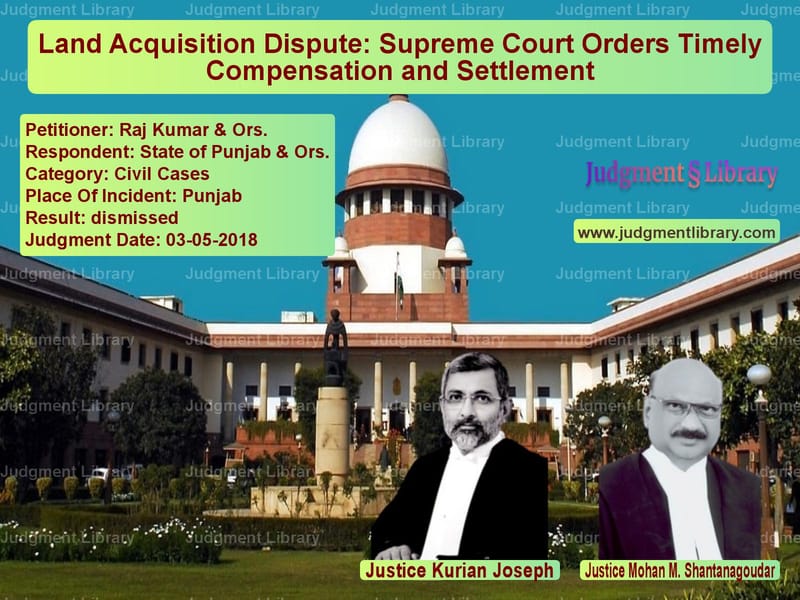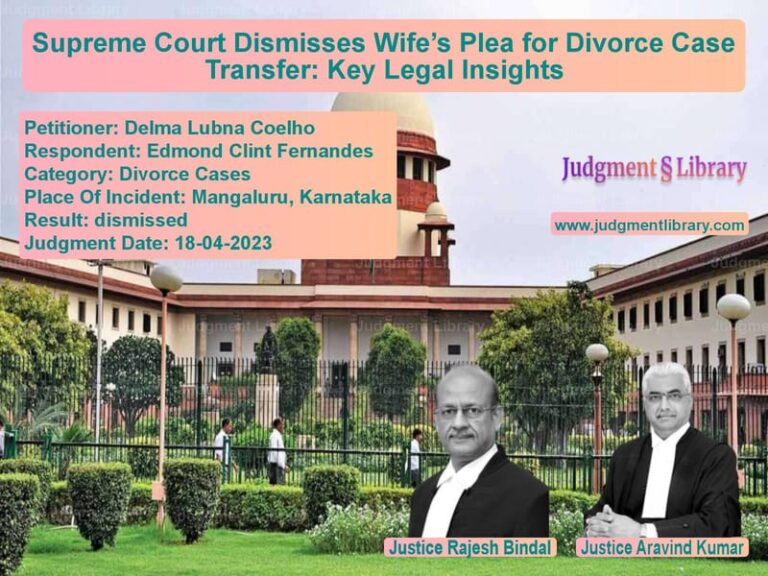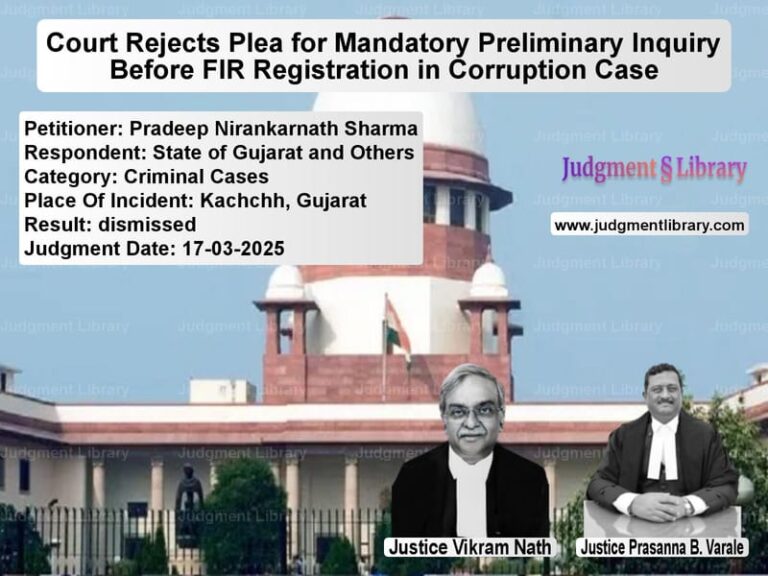Land Acquisition Dispute: Supreme Court Orders Timely Compensation and Settlement
The case of Raj Kumar & Ors. vs. State of Punjab & Ors. revolves around a prolonged land acquisition dispute where the appellants challenged the legality of the acquisition process and the delay in receiving compensation. The Supreme Court was tasked with determining whether the acquisition was legally valid and ensuring that the affected landowners were compensated fairly and promptly.
The appellants had engaged in multiple rounds of litigation over the acquisition of their land for the purpose of setting up a grain market. The Punjab government had initiated land acquisition proceedings under the Land Acquisition Act, 1894, but compensation had not been paid to some of the claimants even after the award was passed. The Supreme Court ruled in favor of settling the matter expeditiously and directed the Reference Court to resolve the pending cases within a strict timeframe.
Background of the Case
The dispute arose when the State of Punjab issued a notification under Section 4(1) of the Land Acquisition Act, 1894, more than a decade ago to acquire land for establishing a grain market. The key facts of the case are:
- The notification under Section 4(1) was issued over ten years before the Supreme Court’s ruling.
- The awards were passed on July 15, 2013, but compensation was not paid to some claimants.
- Several landowners had already approached the Reference Court for enhancement of their compensation.
- The appellants contended that the Section 6 declaration regarding the land acquisition was beyond the prescribed time limit and should be invalidated.
Key Legal Issues Considered
The Supreme Court examined the following legal issues:
- Whether the declaration under Section 6 of the Land Acquisition Act was made within the permissible time.
- Whether the prolonged litigation justified quashing the acquisition process.
- Whether the landowners were entitled to compensation under Section 28A of the Act for redetermination.
- The role of the Reference Court in ensuring timely compensation to affected claimants.
Arguments of the Parties
Petitioner’s (Raj Kumar & Ors.) Arguments
The appellants contended:
- The acquisition process had exceeded the legally prescribed timeline under Section 6(1) of the Act.
- The delay in payment of compensation had caused undue hardship to the affected landowners.
- The claimants had engaged in multiple rounds of litigation due to administrative delays.
- Since some landowners had approached the Reference Court, others should also be granted the right to seek enhanced compensation.
Respondent’s (State of Punjab) Arguments
The respondents countered:
- The acquisition was made in the public interest, specifically for establishing a grain market.
- Delays in compensation were procedural and should not invalidate the acquisition process.
- The government had initiated proceedings in accordance with the Land Acquisition Act, and landowners still had the opportunity to seek redetermination of compensation.
Supreme Court’s Ruling
The Supreme Court ruled that the litigation should be settled without further delays and directed:
“The Reference Court shall dispose of the cases pending for enhancement in respect of the acquisition under challenge within a period of three months from today.”
The Court also issued the following directives:
- The Reference Court must resolve all pending cases related to the enhancement of compensation within three months.
- Landowners who had not yet approached the Reference Court would be allowed to file applications under Section 28A of the Land Acquisition Act within three months after the Reference Court’s award.
- The Collector must take action on Section 28A applications within three months after they are filed.
- The Collector should verify whether appeals had been filed against the Reference Court’s award and await the final outcome before determining compensation under Section 28A.
- The pending claimants who had not been paid the award amount should receive compensation within two months.
- No further legal challenges would be entertained on whether Section 6 had been published within the required time limit.
Key Takeaways from the Judgment
- The Supreme Court reinforced that landowners must receive compensation in a timely manner.
- The ruling ensures that litigation does not become an obstacle to justice for claimants.
- The Court provided an opportunity for landowners who had not approached the Reference Court to seek redetermination of compensation.
- The decision upheld the validity of the land acquisition while ensuring that compensation-related disputes were settled efficiently.
- The ruling highlights the importance of public interest projects and balancing them with the rights of affected landowners.
Conclusion
The Supreme Court’s ruling in this case is a significant development in land acquisition disputes. By directing the prompt settlement of compensation claims, the Court ensured that affected landowners would not be caught in endless litigation.
The decision also emphasizes the role of the Land Acquisition Act, 1894 in protecting the rights of landowners while allowing for the development of public interest projects. By enforcing strict timelines for compensation payment and case resolution, the ruling sets a precedent for similar disputes in the future.
Petitioner Name: Raj Kumar & Ors..Respondent Name: State of Punjab & Ors..Judgment By: Justice Kurian Joseph, Justice Mohan M. Shantanagoudar.Place Of Incident: Punjab.Judgment Date: 03-05-2018.
Don’t miss out on the full details! Download the complete judgment in PDF format below and gain valuable insights instantly!
Download Judgment: Raj Kumar & Ors. vs State of Punjab & Or Supreme Court of India Judgment Dated 03-05-2018.pdf
Direct Downlaod Judgment: Direct downlaod this Judgment
See all petitions in Landlord-Tenant Disputes
See all petitions in Damages and Compensation
See all petitions in Specific Performance
See all petitions in Judgment by Kurian Joseph
See all petitions in Judgment by Mohan M. Shantanagoudar
See all petitions in dismissed
See all petitions in supreme court of India judgments May 2018
See all petitions in 2018 judgments
See all posts in Civil Cases Category
See all allowed petitions in Civil Cases Category
See all Dismissed petitions in Civil Cases Category
See all partially allowed petitions in Civil Cases Category







